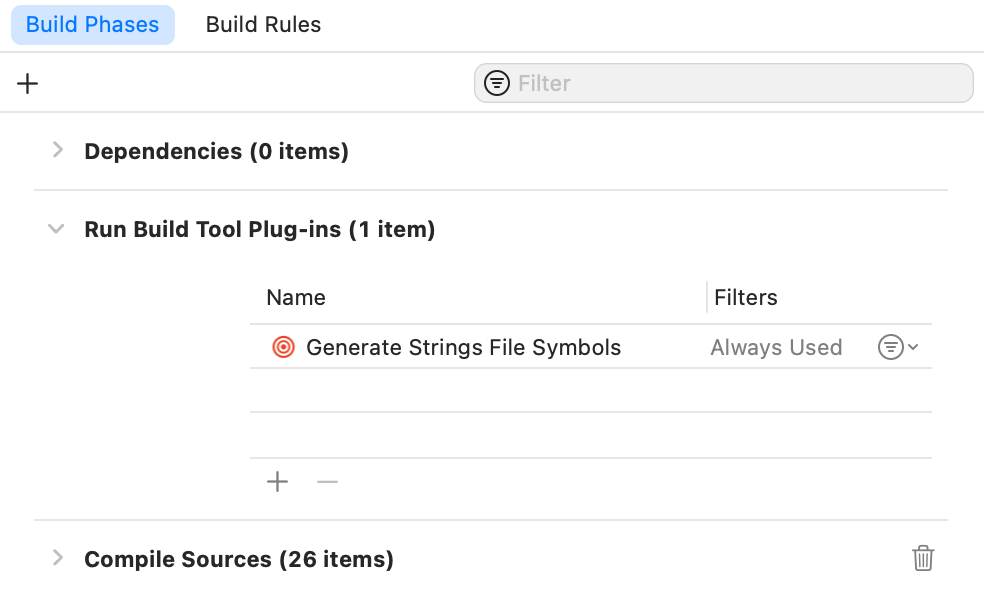An SPM and Xcode build plugin for creating Swift symbols for localized string keys.
This is a very simple build plugin that creates Swift structures representing the keys in your app's .strings files. This allows the compiler to check you're referencing valid strings, and provides some nice features for format tokens.
The plugin creates two "routes" for each key in your .strings file:
-
As an extension on
LocalizedStringKeyfor use with SwiftUI -
As a struct named after the table name (i.e.,
Localizable) for use with everything else.
If you follow the SwiftUI convention of including format specifiers in your keys, the generated structures will automatically include strongly-typed functions for the format values. In SwiftUI contexts(i.e., extensions on LocalizedStringKey), functions are also provided for inlining SF Symbols via Image parameters.
The plugin also offers basic pluralization support via the _Plural suffix for keys.
For example, given the following strings file, named Localizable.strings:
"NameAlertTitle %@" = "Hello %@!";
"OKButtonTitle" = "OK";
"CountdownTitle %@" = "%@ second remaining";
"CountdownTitle_Plural %@" = "%@ seconds remaining";
The output will provide symbols that can be used as such:
// In a SwiftUI context
VStack {
Text(.nameAlertTitle(formatValue: "Daniel"))
Text(.nameAlertTitle(imageValue: Image(systemName: "exclamationmark.triangle")))
Text(.countdownTitle(pluralizationCount: seconds, formatValue: "\(seconds)")
}
// In a non-SwiftUI context
let alertTitle: String = Localizable.nameAlertTitle(formatValue: "Daniel")
let countdownTitle: String = Localizable.countdownTitle(pluralizationCount: seconds, formatValue: "\(seconds)")If you're using strings table names other than Localized.strings, SwiftUI components will need to be told which table to look up the string in (i.e., table name information isn't enapsulated into LocalizedStringKey). This plugin generates a handy getter for you:
Text(.nameAlertTitle(formatValue: "Daniel"), tableName: GeneralUI.tableName)Right now this is a very basic plugin, and as such there are a number of limitations and requirements. If you'd like to help make it better, pull requests are welcome!
-
Strings file keys are expected to be in CamelCase, with format specifiers space-separated at the end of the key matching in number to the ones in the value (for example:
"NameAlertTitle %@" = "Hello %@!";). -
Only the
%@format specifier is supported. -
Multiple format specifiers aren't very intelligent in the
LocalizedStringKeyoutput. For example, if you have two specifiers and want one format value to be aStringand the other anImage, that isn't currently provided for. -
In the
LocalizedStringKeyoutput, only functions withStringandImageparameters are generated. -
It doesn't appear that build plug-ins can find out what a project's development language is, so instead the plug-in chooses the
.stringsfile with the most keys in it as the source.
Important: Build plugins like this one require Xcode 14 beta 3 or higher.
First, add the package to your project by clicking the + button at the bottom of the package list in your project's Package Dependencies tab, then pasting the package's URL into the search field: https://github.com/iKenndac/localized-strings-symbols.git.
Then, in the following dialog, make sure the package is added as a dependency to the relevant target(s).
Finally, go to your target(s) Build Phases tab, and in the Run Build Tool Plug-ins phase, add the plug-in.
First, add the package to your dependencies list:
…
dependencies: [
.package(url: "https://github.com/iKenndac/localized-strings-symbols.git", branch: "main")
],
…Then, add the dependency and the plugin to your target(s):
…
.executableTarget(
name: "MyCoolPackage",
plugins: [.plugin(name: "Generate Strings File Symbols", package: "localized-strings-symbols")]
),
…